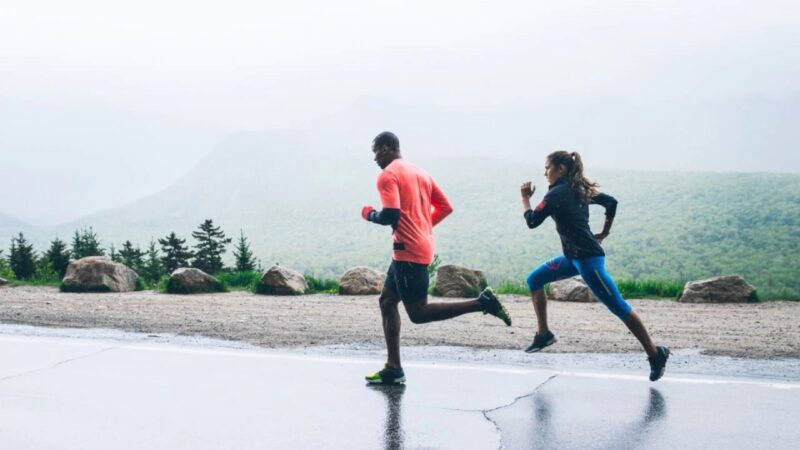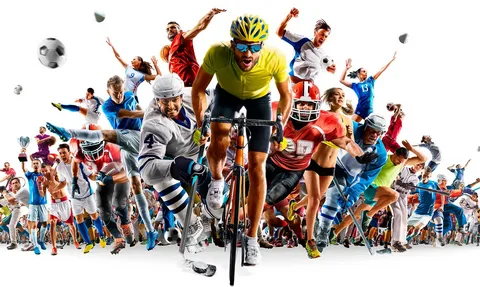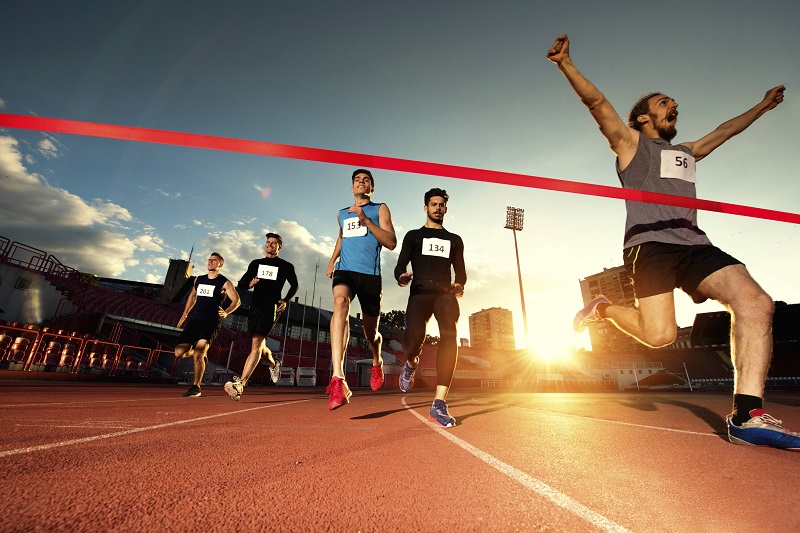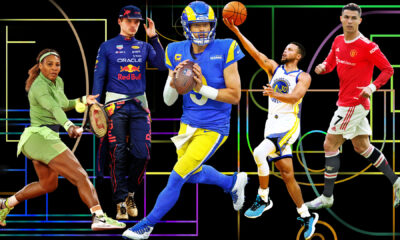Sports
Top 10 Iconic Moments in Sports History: A Legacy of Excellence and Inspiration
Sports have always been a reflection of the human spirit, showcasing courage, determination, and resilience. Over the years, there have been moments in sports history that transcended boundaries, inspired millions, and etched themselves into our collective memory. This article highlights the top 10 iconic moments in sports history, celebrating the achievements and emotions that define these unforgettable events.
1. Jesse Owens Defies Racism at the 1936 Berlin Olympics
Jesse Owens’ performance at the 1936 Summer Olympics in Berlin is a testament to the triumph of the human spirit over prejudice. Amidst the backdrop of Nazi propaganda promoting racial superiority, Owens, an African-American athlete, won four gold medals in track and field. His victories sent a powerful message, shattering racial stereotypes and leaving an indelible mark on sports history.
2. The Miracle on Ice (1980 Winter Olympics)
The USA Men’s Ice Hockey Team pulled off one of the greatest upsets in sports history during the 1980 Winter Olympics in Lake Placid. Facing the heavily favored Soviet Union team, the young and inexperienced American squad secured a 4-3 victory. This iconic moment, dubbed the “Miracle on Ice,” not only symbolized a triumph of the underdog but also carried immense political significance during the Cold War era.
3. Muhammad Ali vs. George Foreman – “The Rumble in the Jungle” (1974)
The legendary boxing match between Muhammad Ali and George Foreman in Kinshasa, Zaire, remains one of the most celebrated bouts in boxing history. Ali, known for his charisma and “rope-a-dope” strategy, defeated the reigning heavyweight champion Foreman in the eighth round. This victory solidified Ali’s legacy as “The Greatest” and showcased his unmatched tactical brilliance.
4. Roger Bannister Breaks the 4-Minute Mile Barrier (1954)
On May 6, 1954, Roger Bannister achieved what many thought was impossible: breaking the 4-minute mile. With a time of 3:59.4, Bannister’s historic run at Oxford University redefined human athletic potential. This moment remains a symbol of perseverance and the power of belief in achieving the extraordinary.
5. The Hand of God – Diego Maradona (1986 FIFA World Cup)
The 1986 FIFA World Cup saw one of the most controversial yet iconic moments in football history. In the quarterfinal against England, Diego Maradona scored the infamous “Hand of God” goal, followed by the “Goal of the Century.” Maradona’s brilliance and audacity encapsulated his enigmatic legacy and elevated Argentina to World Cup glory.
6. Michael Phelps’ Record-Breaking 8 Gold Medals (2008 Beijing Olympics)
The 2008 Beijing Olympics witnessed an unparalleled display of swimming prowess by Michael Phelps. By winning eight gold medals, Phelps surpassed Mark Spitz’s record from 1972, solidifying his position as the greatest Olympian of all time. His determination, work ethic, and mastery of multiple swimming disciplines have inspired generations of athletes.
7. Serena Williams Wins Australian Open While Pregnant (2017)
Serena Williams, one of tennis’ greatest icons, won the 2017 Australian Open while eight weeks pregnant. This moment not only highlighted her physical and mental strength but also cemented her legacy as a trailblazer in women’s sports. Her resilience and dominance in a highly competitive sport continue to inspire athletes worldwide.
8. Tiger Woods’ Comeback at the 2019 Masters
After years of personal and professional struggles, Tiger Woods staged one of the most remarkable comebacks in sports history by winning the 2019 Masters Tournament. This victory, his 15th major title and first in 11 years, was a poignant reminder of redemption, resilience, and the enduring spirit of champions.
9. Usain Bolt’s Unmatched Speed – 100m World Record (2009)
At the 2009 World Athletics Championships in Berlin, Usain Bolt set a jaw-dropping world record of 9.58 seconds in the 100-meter sprint. Known as the “Lightning Bolt,” his electrifying speed and charisma captivated the world. Bolt’s achievements redefined sprinting and solidified his status as one of the greatest athletes of all time.
10. Simone Biles’ Withdrawal to Prioritize Mental Health (2021)
During the 2021 Tokyo Olympics, Simone Biles, widely regarded as the greatest gymnast of all time, made headlines not for her medals but for prioritizing her mental health. Her courageous decision to step back from competition sparked global conversations about the importance of mental well-being, making this moment as impactful off the field as it was on it.
The Common Thread: Defying the Odds
Each of these moments is a powerful reminder of the resilience, dedication, and passion that define great athletes. Whether breaking barriers, achieving the impossible, or inspiring change, these events resonate far beyond the sports arena, leaving a legacy of hope and determination.

Sports
How Climate Change is Affecting Outdoor Sports: A Comprehensive Analysis

Climate change, an undeniable global phenomenon, has begun to influence every aspect of human life, including outdoor sports. From extreme weather events to shifts in seasonal patterns, athletes, organizers, and enthusiasts are facing unprecedented challenges. This article explores how climate change is affecting outdoor sports, its implications, and potential solutions to adapt to this evolving reality.
The Growing Impact of Climate Change on Outdoor Sports
Unpredictable Weather Patterns
Outdoor sports depend heavily on predictable weather. However, climate change has led to erratic weather conditions, disrupting schedules and reducing the reliability of traditional venues.
- Case Study: The Wimbledon tennis tournament has experienced delays due to unexpected rain, prompting the installation of retractable roofs to ensure continuity.
Rising Temperatures
High temperatures pose risks to athletes’ health and performance. Heat-related illnesses such as heatstroke and dehydration have become common during events like marathons and cycling races.
- Notable Example: The 2020 Tokyo Olympics had to reschedule events to early mornings to combat the intense summer heat, highlighting the direct effects of rising temperatures.
Reduced Snowfall for Winter Sports
Winter sports like skiing and snowboarding are highly vulnerable to declining snowfall. Reduced snow cover and shorter winters are impacting traditional training and competition grounds.
- Statistical Insight: According to a report by the U.S. Geological Survey, snowpacks have reduced by over 20% in many regions since the 1980s.
The Effect on Specific Outdoor Sports
Skiing and Snowboarding
The dwindling snow cover in alpine regions is shortening the skiing season and threatening the existence of popular resorts. Artificial snow is increasingly being used, but it comes with significant environmental costs.
- Impact on Events: Prestigious events like the Winter Olympics face challenges in finding suitable host cities with adequate natural snow.
Water Sports
Rising sea levels and changing ocean currents affect water-based activities like surfing, sailing, and diving. Warmer oceans also disrupt marine ecosystems, leading to less predictable wave patterns and altered underwater biodiversity.
- Real-Life Impact: Coral bleaching has affected iconic diving spots like the Great Barrier Reef, reducing their appeal for sport tourism.
Marathons and Triathlons
Prolonged exposure to extreme heat during marathons and triathlons can endanger participants’ health. Organizers now need to invest in extensive hydration facilities and medical services to mitigate risks.
- Adaptive Measures: Some marathons are shifting dates to cooler months or starting events earlier in the day.
Cycling
Cycling routes are increasingly vulnerable to extreme weather events like floods and wildfires. In addition, rising temperatures reduce air quality, which can impact cyclists’ respiratory health.
- Case Example: The Tour de France has faced route changes due to landslides and wildfires in recent years.
The Economic Implications
The economic footprint of outdoor sports is significant, encompassing ticket sales, sponsorships, and tourism. Climate change threatens this ecosystem in several ways:
- Decreased Revenue: Frequent cancellations and venue changes disrupt ticket sales and tourism-dependent businesses.
- Increased Costs: Organizers face higher costs for implementing adaptive measures, such as artificial snowmaking or advanced cooling systems.
- Insurance Challenges: Insuring events against climate risks has become costlier, putting a financial strain on stakeholders.
Environmental Impacts of Adaptation Measures
While sports organizations are adopting measures to combat climate impacts, some of these adaptations contribute further to environmental degradation:
- Artificial Snowmaking: Requires large quantities of water and energy, exacerbating water scarcity and carbon emissions.
- Air Conditioning in Venues: Indoor cooling systems for outdoor events generate high electricity consumption and greenhouse gas emissions.
- Venue Relocation: Moving events to more stable climates increases carbon footprints due to transportation.
How Athletes and Organizations Are Adapting
Sustainable Practices in Sports
Sports organizations are increasingly embracing sustainability to mitigate climate impacts:
- Renewable energy initiatives, such as installing solar panels in stadiums and event venues.
- Green certifications, such as ISO 20121, for sustainable event management.
- Eco-friendly equipment, including biodegradable or recyclable sports gear.
Athlete Advocacy
Athletes are leveraging their platforms to raise awareness about climate change and inspire collective action. Notable examples include:
- Greta Thunberg-inspired initiatives where athletes advocate for carbon-neutral competitions.
- Social media campaigns from prominent players engaging in digital activism for environmental causes.
Technological Innovations
Advanced technologies are being employed to minimize the environmental footprint of outdoor sports:
- Drones for monitoring and mitigating environmental impacts during events.
- AI tools to predict weather patterns and plan safer, more sustainable schedules.
- Biofuels as alternatives to traditional fuels for transportation during events.
The Role of Fans and Spectators
Spectators play a crucial role in shaping the future of outdoor sports. Here’s how they can contribute:
- Choosing eco-friendly travel options like carpooling or public transport to attend events.
- Reducing waste by avoiding single-use plastics and supporting recycling initiatives at venues.
- Participating in clean-up drives to maintain environmental sanctity after events.
Government and Policy Interventions
Governments worldwide are stepping in to safeguard the future of outdoor sports through:
- Legislation: Introducing policies that regulate emissions and promote sustainability in sports infrastructure.
- Funding Research: Supporting innovations that mitigate climate risks in sports.
- Promoting Green Tourism: Incentivizing eco-friendly practices in sports tourism hubs.
Future Outlook: What Lies Ahead for Outdoor Sports?
The future of outdoor sports will likely depend on how effectively stakeholders can adapt to climate challenges. Key trends include:
- Hybrid events combining virtual and physical elements to reduce carbon footprints.
- Dynamic scheduling with flexibility to accommodate unpredictable weather conditions.
- Increased collaboration between sports organizations, governments, and environmental groups to develop holistic solutions.
Conclusion
The interplay between climate change and outdoor sports is a call to action for athletes, organizers, spectators, and policymakers alike. By embracing sustainable practices and investing in innovative solutions, the sports industry can adapt to climate challenges while setting an example for environmental stewardship. The game isn’t over; it’s just evolving.
Sports
The Impact of Sports on Society and Culture

Sports have transcended their primary purpose of entertainment to become a significant cultural and societal phenomenon. From fostering unity to driving social change, the impact of sports on society and culture is profound and multifaceted. This article delves into how sports influence communities, challenge societal norms, and promote global cultural exchange.
The Universal Appeal of Sports
Sports are universal, cutting across barriers of language, ethnicity, and geography. The global passion for events such as the FIFA World Cup or the Olympic Games underscores their capacity to unite people worldwide. The emotional connection fans feel toward their favorite teams fosters a sense of belonging, transcending individual differences and creating collective identity.
Fostering Unity and Inclusion
Sports serve as a bridge between diverse communities, promoting inclusivity and understanding. Events like the Paralympic Games highlight the resilience of individuals with disabilities, showcasing their skills and inspiring millions. Similarly, sports leagues often bring together players from different countries, showcasing a spirit of cooperation and mutual respect.
Cultural Representation through Sports
Sports also act as a platform for cultural representation. Athletes often become ambassadors of their nations, bringing attention to their country’s heritage and values. Traditional sports like sumo wrestling in Japan or kabaddi in India are celebrated globally, fostering appreciation for diverse cultural practices.
Sports as a Catalyst for Social Change
The role of sports in driving societal change cannot be overstated. From addressing racial inequality to advocating for gender equity, sports have often been at the forefront of challenging societal norms.
Promoting Gender Equality
The rise of women’s sports has been instrumental in breaking stereotypes and promoting gender equality. High-profile athletes like Serena Williams and Megan Rapinoe have not only excelled in their respective fields but have also championed causes such as equal pay and women’s rights. The increased visibility of female athletes inspires young girls to pursue sports, empowering them to challenge traditional gender roles.
Advocating for Racial Equality
Sports have historically been a battleground for racial equality. From Jackie Robinson breaking the color barrier in baseball to Colin Kaepernick taking a knee during the national anthem, athletes have used their platform to raise awareness about racial injustice. These acts of defiance and advocacy resonate far beyond the playing field, influencing societal attitudes and policies.
Economic Impact of Sports
Sports contribute significantly to the global economy, creating jobs and driving investment. From stadium construction to broadcasting rights, the sports industry fuels numerous sectors.
Boosting Local Economies
Major sporting events often lead to economic booms in host cities. The influx of tourists for events like the Super Bowl or the UEFA Champions League final generates revenue for local businesses. Infrastructure development for such events also leaves a lasting impact on the host community.
Creating Employment Opportunities
The sports industry provides employment opportunities not just for athletes but also for coaches, physiotherapists, marketers, and many others. The rise of esports has further diversified career options, highlighting the evolving landscape of sports and entertainment.
Sports and Health Promotion
Sports play a crucial role in promoting physical and mental well-being. Participation in sports helps individuals stay active, reduce stress, and build discipline.
Encouraging Active Lifestyles
Community sports programs encourage people to adopt healthier lifestyles. Governments and organizations often use sports as a tool to combat sedentary behavior, particularly among youth. Campaigns promoting activities like running or cycling have a measurable impact on public health.
Mental Health Benefits
The mental health benefits of sports are equally significant. Engaging in sports reduces stress, alleviates anxiety, and promotes a sense of accomplishment. The camaraderie and teamwork fostered through sports contribute to emotional well-being and social connectivity.
The Influence of Sports on Education
Sports and education are intrinsically linked, with sports serving as a medium to impart life skills and values to young individuals.
Character Development
Participation in sports teaches important life skills such as teamwork, leadership, and perseverance. These attributes are not only essential on the field but also in professional and personal settings.
Scholarship Opportunities
Sports also provide educational opportunities through scholarships. Talented athletes, particularly in countries like the United States, can access higher education through sports scholarships, broadening their horizons and paving the way for future success.
Sports and Media: A Symbiotic Relationship
The media has transformed sports into a global spectacle, amplifying its cultural impact. In turn, sports have become a lucrative content segment for media houses.
The Role of Broadcasting
Television and online streaming platforms have brought sports into every home, making it accessible to billions. Iconic moments such as Usain Bolt’s record-breaking sprints or Lionel Messi’s goals are etched into collective memory, thanks to extensive media coverage.
Social Media and Fan Engagement
Social media has revolutionized fan engagement, allowing direct interaction between athletes and their supporters. Platforms like Twitter and Instagram enable fans to follow their favorite athletes, creating a more personal connection. Social media also serves as a tool for athletes to advocate for social causes, broadening their influence.
Globalization of Sports
Sports have become a powerful force in globalization, fostering cultural exchange and international cooperation.
Cultural Exchange through International Events
International sports tournaments bring together athletes and fans from around the globe, creating opportunities for cultural exchange. Events like the Olympics celebrate diversity, showcasing the traditions and customs of participating nations.
The Role of Multinational Sponsorships
Global brands sponsoring sports events further highlight the interconnectedness of the world. Companies like Nike and Adidas not only promote their products but also bridge cultural gaps by associating with athletes from diverse backgrounds.
Challenges Facing the World of Sports
Despite its positive impact, sports are not without challenges. Issues like corruption, doping, and commercialization pose significant threats to its integrity.
Corruption and Governance Issues
High-profile cases of corruption, such as the FIFA scandal, highlight the need for better governance in sports organizations. Transparency and accountability are crucial to maintaining public trust.
The Doping Epidemic
Doping scandals tarnish the spirit of fair play, undermining the credibility of sports. Stricter regulations and advanced testing methods are essential to combat this issue.
Overcommercialization
While commercialization has fueled the growth of sports, it has also led to concerns about its excessive influence. Critics argue that the focus on profits often overshadows the essence of sportsmanship and fair competition.
The Future of Sports
As society evolves, so too will the role of sports. Emerging trends like esports and technological innovations are set to redefine how sports are played and consumed.
The Rise of Esports
Esports, or competitive video gaming, has emerged as a major player in the sports industry. With millions of fans worldwide, it challenges traditional notions of sports while attracting a younger audience.
Technological Innovations
Technology is transforming sports in unprecedented ways. From wearable devices that monitor performance to virtual reality training tools, advancements are enhancing both player capabilities and fan experiences.
Conclusion
The impact of sports on society and culture is vast and enduring. By fostering unity, promoting health, driving economic growth, and serving as a platform for social change, sports enrich human lives in countless ways. As we look to the future, the evolving landscape of sports promises even greater possibilities for cultural and societal transformation.
In embracing the power of sports, we celebrate not just athletic achievement but the values that unite us as a global community.
Sports
Why Mental Health Matters in Competitive Sports

In the high-stakes world of competitive sports, the focus often revolves around physical prowess, technical skill, and strategic planning. Athletes are celebrated for their physical endurance, discipline, and ability to perform under pressure. Yet, an essential component of athletic success that is often overlooked is mental health. With growing awareness about the importance of mental well-being, both athletes and organizations are starting to recognize that a healthy mind is just as critical as a healthy body.
The High-Pressure Environment of Competitive Sports
Competitive sports are synonymous with pressure. Athletes are expected to excel consistently, meet the expectations of fans, sponsors, and teams, and maintain a rigorous training schedule. Such demands can lead to stress, anxiety, and burnout.
For example, tennis champion Naomi Osaka’s decision to withdraw from the 2021 French Open to prioritize her mental health sparked global conversations. Similarly, gymnast Simone Biles’ decision to step back from certain events during the Tokyo Olympics brought attention to the psychological challenges athletes face. These examples highlight the need for a balanced approach to mental health in sports.
Why Mental Health Matters
Mental health is crucial in sports for several reasons:
- Enhanced Performance: A focused and confident athlete is more likely to perform at their peak. Mental clarity helps in decision-making and resilience during high-pressure situations.
- Prevention of Burnout: Managing mental health reduces the likelihood of physical and emotional exhaustion, which can derail an athlete’s career.
- Long-Term Career Sustainability: Athletes with good mental health are more likely to have extended careers, as they can better cope with the demands of training, competition, and life beyond sports.
- Overall Well-Being: Beyond the field, mental health contributes to a fulfilling personal life, enabling athletes to build relationships, enjoy leisure activities, and prepare for life after retirement.
Common Mental Health Challenges in Sports
Several mental health challenges are prevalent in the world of competitive sports:
- Performance Anxiety: The fear of failure or not meeting expectations can cause intense stress. This often manifests as “choking” during critical moments in competition.
- Depression: Athletes may struggle with depression due to injuries, failure to achieve goals, or the pressure to meet high expectations.
- Burnout: Intense training schedules and constant competition can lead to physical and emotional exhaustion.
- Substance Abuse: Some athletes resort to substance abuse to cope with stress, anxiety, or to enhance performance.
- Post-Career Transition: The transition from an active sports career to retirement can be jarring, leading to identity crises and mental health challenges.
The Role of Sports Psychology
Sports psychology has emerged as a vital discipline to address the mental health needs of athletes. This field focuses on:
- Building Mental Resilience: Techniques such as visualization, mindfulness, and positive reinforcement help athletes cope with pressure and setbacks.
- Enhancing Focus: Concentration strategies enable athletes to maintain focus during critical moments in competition.
- Fostering Team Cohesion: Team dynamics often play a significant role in performance. Sports psychologists work on building trust and communication within teams.
- Coping Mechanisms: Developing strategies to handle stress, failure, and criticism is a key focus area.
Initiatives and Programs Supporting Mental Health in Sports
The growing acknowledgment of mental health in sports has led to various initiatives:
- Mental Health Policies: Organizations like the NBA and NFL have introduced mental health policies, providing athletes with access to counseling and support.
- Athlete Advocacy: High-profile athletes are using their platforms to advocate for mental health. Examples include Michael Phelps, who has openly discussed his struggles with depression, and Kevin Love, who has highlighted the importance of seeking help.
- Workshops and Training: Teams and organizations are conducting workshops to educate athletes about mental health and coping strategies.
- Technology Integration: Apps and platforms focusing on mental health, such as meditation apps and online counseling services, are being integrated into training regimes.
Breaking the Stigma Around Mental Health
Despite progress, stigma around mental health remains a significant barrier in sports. Many athletes fear being labeled as “weak” or “uncommitted” if they seek help. Changing this narrative requires:
- Education: Educating coaches, teams, and fans about the importance of mental health.
- Role Models: Encouraging athletes who have faced mental health challenges to share their stories.
- Supportive Environments: Creating an atmosphere where seeking help is normalized and encouraged.
Strategies for Athletes to Prioritize Mental Health
Athletes can adopt several strategies to maintain and improve their mental health:
- Regular Mental Health Checkups: Just as physical health is monitored, regular mental health assessments should be a part of an athlete’s routine.
- Mindfulness Practices: Meditation, yoga, and breathing exercises can help reduce stress and enhance focus.
- Balanced Training Schedules: Incorporating rest and recovery into training plans is essential to avoid burnout.
- Open Communication: Building a support system of coaches, teammates, and family members who can provide encouragement and understanding.
- Professional Help: Seeking the assistance of sports psychologists or counselors when needed.
The Impact of Social Media on Athlete Mental Health
Social media has transformed how athletes connect with fans, but it also introduces challenges. The pressure to maintain a positive public image, deal with criticism, and manage expectations can affect mental health. Athletes can manage these challenges by:
- Setting Boundaries: Limiting time spent on social media and avoiding negative comments.
- Focusing on Positivity: Engaging with supportive fans and sharing uplifting content.
- Seeking Support: Using mental health professionals to navigate the pressures of online platforms.
The Way Forward
Addressing mental health in competitive sports requires a collective effort. Athletes, coaches, organizations, and fans must work together to create an environment where mental well-being is prioritized.
Conclusion
Mental health is integral to success in competitive sports. Recognizing and addressing the mental health needs of athletes ensures not only improved performance but also a healthier and more fulfilling life. As awareness continues to grow, it is crucial for the sports community to champion mental health as an essential component of athletic excellence.
-

 Sports2 weeks ago
Sports2 weeks agoHow Climate Change is Affecting Outdoor Sports: A Comprehensive Analysis
-

 Sports2 weeks ago
Sports2 weeks agoThe Impact of Sports on Society and Culture
-

 Sports2 weeks ago
Sports2 weeks agoWhy Mental Health Matters in Competitive Sports
-

 Health2 weeks ago
Health2 weeks agoThe Role of Fiber in Gut Health: Foods to Focus On
-

 Sports2 weeks ago
Sports2 weeks agoThe Evolution of Modern Sports: A Historical Perspective
-

 Business2 weeks ago
Business2 weeks ago10 Little-Known Facts About Small Business Success
-

 Business2 weeks ago
Business2 weeks agoThe Science of Innovation: 12 Facts Every Entrepreneur Should Know
-
Business2 weeks ago
10 Interesting Facts About Business During the Great Depression
